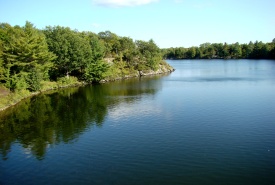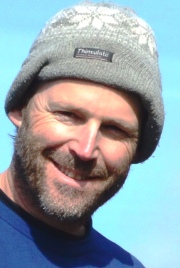Life in freshwater country: How helping water helps Canada (Part One)

Elbow Lake, Frontenac Arch, ON (Photo by NCC)
If you are Canadian, either by chance or by choice, you probably have a story about water. It might be learning to paddle a canoe, pulling your first fish from the water or standing on the dock on the May 24 weekend with friends, challenging each other to be the first to jump in the still chilly waters.
From the canoe to the beaver to pond hockey, water stories are part of our culture, and part of Canada.
Water stories are part of my memory. Early morning fishing with my dad and Uncle Jeff in Lake Temagami. Swimming in the old quarry with friends. Learning that three guys and two cases of beer exceeds the capacity of a 15-foot canoe. We live in a country of abundant, accessible waters that flow through all our lives.
Canadian summers, when our lakes and rivers break free from ice and snow, are a good time to reflect on water. The 2016 RBC Canadian Water Attitudes Study found that we are anxious to connect with water. The survey found that this past spring more than 65 per cent of Canadians had planned to spend time outdoors on or near water on Victoria Day, our annual Canadian rituals of cottage, cabin, camp or beach.
Earth: A water planet
But the importance of water is much deeper than stories, recreation and even culture. Although we may think our modern world is built and sustained through riches or roads or reason, none of these exist without water.
On this water planet (that is more water than land), accessible freshwater is a rare and valuable resource. About 97 per cent of all water is saltwater. This saltwater is absolutely critical for life on Earth. It supports millions of species and rich ecosystems, and drives the biochemical and climate cycles that sustain life. But we cannot drink it.
Of the small amount of water that is fresh, much of it is locked away in glaciers and deep in the ground, with only a tiny fraction readily available for life. This is water that is contained in lakes, rivers, wetlands, trees and people. This is the water we all depend on.
Canada is a freshwater country
Canada has an extraordinary endowment of accessible freshwater. Even for a big country like Canada (with about six per cent of the planet’s real estate), it’s clear we have a disproportionate amount of freshwater. We have more lakes than every other country combined. Twenty-five per cent of the world’s wetlands occur in Canada. The length of rivers in Canada could circle the world 400 times. Almost one-quarter of our home and native land is made up of water and wetlands; an area larger than Mexico.
We may have an abundance of water in Canada, but the quality and security requires new investment — a new vigilance. While our north contains wild lakes and rivers that remain unnamed, southern Canada, where almost nine in 10 Canadians live, is not immune to the water woes that face the rest of the world.
Many issues face our Canadian freshwaters. The RBC Canadian Water Attitudes Study found that a majority of Canadians across the country are concerned about the quality of their lakes, rivers and streams. Our water woes will increase as our population grows. Climate change will accelerate and magnify many of our top Canadian water issues, including non-point source pollution and changes in natural flow regimes.
Stay tuned for Part Two of this blog on September 6, 2016, where I showcase creative solutions in three NCC projects across the country.


